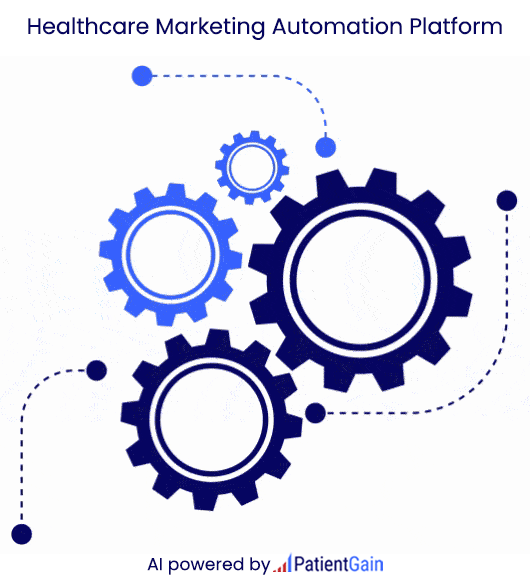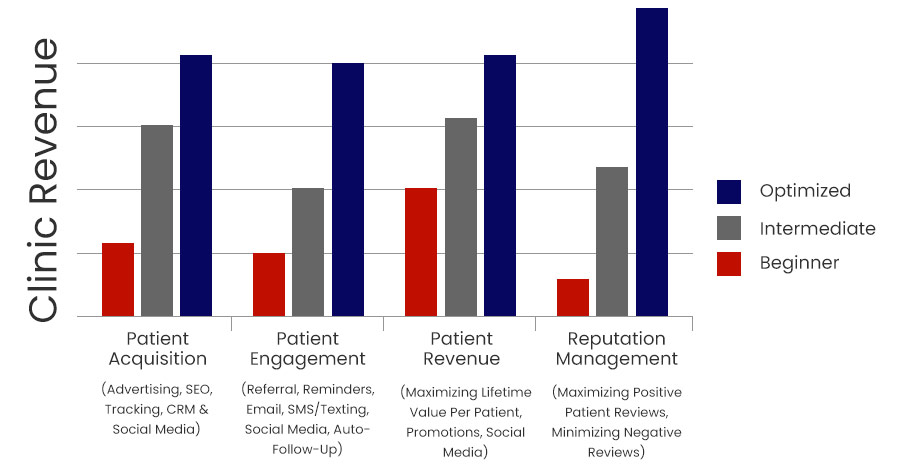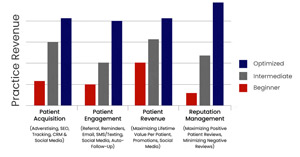AI Medical Marketing For Physicians and Dentists
What is AI (artificial intelligence) medical marketing?
Medical marketing that uses artificial intelligence (AI) agents and technologies to significantly enhance the effectiveness and efficiency of marketing campaigns within the healthcare patient acquisition and patient retention, while maintaining HIPAA compliance. This approach is transforming how healthcare practices interact with potential patients and improve new patient acquisition results. Resulting in lower patient acquisition costs, and improving is patient retention and satisfaction.

AI Medical Marketing Table of Contents
1. Key question to ask about AI healthcare marketing
2. Key AI Tools for Healthcare Marketing
3. Patient acquisition and digital presence
4. Patient engagement and retention
5. Reputation management
6. Lead generation and conversion
7. Workflow automation and efficiency
8. Conclusion: Why healthcare practices need to embrace AI
Key question asked by providers and practice managers: How AI Can Improve Targeted Healthcare Marketing?
“AI marketing for doctors” refers to utilizing artificial intelligence technology to analyze patient data and tailor marketing campaigns, delivering personalized messages and content to attract new patients and retain existing ones, ultimately optimizing a doctor’s marketing strategy by creating highly relevant and targeted SEO, Google PPC ads, Social media ads, Social media posts (20 posts per month) and outreach (like newsletters based on conditions and treatments & then also offers) based on individual patient needs and preferences.
1. Personalized Patient Experiences
- Tailored Messaging: AI can analyze patient data, such as demographics, preferences, and health conditions, to deliver customized messages that resonate with individual needs.
- Example: Sending personalized reminders for flu shots or follow-up appointments based on a patient’s health history.
- Predictive Analytics: AI predicts future patient needs, enabling proactive outreach with relevant offers, reminders, and educational content.
- Example: Identifying patients likely to need physical therapy and offering targeted campaigns about available treatments.
2. Enhanced Patient Engagement
- AI-Powered Chatbots: AI-driven chatbots provide 24/7 support, answering patient queries, scheduling appointments, and guiding them through the healthcare journey.
- Example: Chatbots offering step-by-step guidance for telehealth appointment setup.
- Social Media Listening: AI monitors social media platforms to gauge patient sentiment, identify concerns, and respond to feedback promptly, building stronger relationships.
- Example: Addressing trending patient concerns about seasonal illnesses via social media campaigns.
3. Improved Campaign Effectiveness
- Predictive Modeling: AI forecasts the success of various marketing strategies, helping healthcare providers allocate resources effectively.
- Example: Predicting which PPC campaigns are most likely to drive traffic for urgent care services.
- Real-Time Optimization: AI-powered tools monitor campaign performance and make instant adjustments to maximize return on investment (ROI).
- Example: Adjusting ad spend in real-time for high-performing geotargeted ads promoting flu clinics.
4. Data-Driven Decision Making
- Comprehensive Data Analysis: AI analyzes large datasets to identify trends, patterns, and insights that inform and refine marketing strategies.
- Example: Analyzing patient engagement data to identify high-priority services for seasonal demand.
- Advanced Market Segmentation: AI segments the target audience into specific groups based on behavior, preferences, and needs, allowing hyper-targeted marketing.
- Example: Creating separate campaigns for young professionals seeking telehealth and seniors needing chronic care support.
5. Technology & Convenience
- Marketing Automation: AI automates repetitive tasks, such as sending personalized email campaigns or posting on social media.
- Example: Automated reminders for annual wellness checkups.
- Predictive Analytics Tools: AI uses historical data to predict trends, helping healthcare providers stay ahead of patient needs.
- Example: Predicting an increase in telehealth demand during flu season and optimizing marketing accordingly.
6. Ethical Considerations and Privacy
- Data Privacy Compliance: As AI collects and processes patient data, healthcare providers must ensure strict adherence to privacy regulations like HIPAA and GDPR.
- Responsible Use: Transparency and ethical practices in AI applications are crucial to maintaining patient trust and fostering long-term relationships.
PatientGain’s Key AI Tools for Healthcare Marketing
- CRM Systems: AI-powered CRM tools help manage patient relationships, track interactions, and personalize communications.
- SPOC app from PatientGain: The PatientGain SPOC app is a HIPAA-compliant mobile and desktop application that functions as a Single Point Of Conversion for healthcare practices to manage all inbound patient communications, including website forms, text messages, and phone calls, from a centralized dashboard. It uses AI to automate responses, track leads, and direct inquiries from both new and existing patients to the appropriate channels, streamlining communication and improving efficiency for healthcare providers. SPOC is also used for HIPAA-compliant attribution of leads.
- Marketing Automation Platforms: Platforms like HubSpot or Marketo automate marketing efforts, including email campaigns and social media posts. PatientGain’s Social AutoPilot is an AI-powered app designed to automate and optimize social media management for healthcare practices, helping them create and schedule posts across platforms like Google My Business, Instagram and Facebook to save time, increase patient engagement, and maintain a consistent online presence. The service uses AI to enhance post relevance and impact, offers customization, and provides access to an experienced project manager to help healthcare providers manage their social media strategy effectively while ensuring HIPAA compliance
- AI Analytics Tools: Tools such as Google Analytics with AI enhancements offer in-depth insights into patient behavior and marketing performance. The Realtime Marketing Dashboard with AI enhancements from PatientGain is a HIPAA-compliant platform for healthcare practices that provides a centralized, data-driven view of a practice’s marketing and patient engagement efforts
- It uses artificial intelligence (AI) and automation to optimize marketing campaigns and patient interactions in real-time, helping to attract and retain patients more efficiently.
- Chatbots and Virtual Assistants: AI chatbots streamline patient support and engagement.
PatientGain.com uses its AI based applications to automate various day-to-day scenarios for medical practice marketing, advertising, SEO enhancements, Social media posts, Email marketing (done for you) allowing healthcare practices to streamline their operations, attract new patients, and enhance existing patient engagement. This includes creating a high conversion medical or dental website for your practice.
1. Patient acquisition and digital presence
- SEO & online advertising: PatientGain automates the process of creating and optimizing websites for search engines (SEO) and managing online ad campaigns (including Google and social media ads) to increase online visibility and attract potential patients. Their platforms optimize websites using medical schema markup, ensuring higher ranking in local search results.
- Targeted campaigns: They utilize AI and data intelligence to target specific demographics and patient behaviors, delivering personalized marketing messages and content to attract new patients, ultimately optimizing marketing efforts and reducing acquisition costs.
- Website features: PatientGain offers high-conversion websites designed to attract and engage patients, including features like a single super AI-connect app, that replaces 6 apps and acts like an intelligent
2. Patient engagement and retention
- Communication tools: PatientGain offers automated communication tools like two-way texting, email campaigns, and chatbots to improve patient communication and engagement.
- Automated reminders & alerts: The platform includes features for sending automated appointment reminders and alerts, reducing missed appointments and improving patient flow.
- Intelligent chatbot app: PatientGain utilizes AI chatbots that can perform tasks, enhance patient engagement, and streamline processes, particularly for practices offering telemedicine or virtual consultations.
3. Reputation management
- Online review management: PatientGain automates the process of monitoring and managing online reviews across various platforms like Google, Yelp, Facebook, and Healthgrades. The system can alert practices to negative reviews, enabling prompt response and effective reputation management.
- Encouraging positive reviews: PatientGain helps healthcare providers solicit positive reviews from satisfied patients, strengthening the practice’s online reputation and building trust. They might automate follow-up emails asking patients to review after their appointment.
4. Lead generation and conversion
- Leads funnel & CRM: PatientGain provides a Leads Funnel App and a HIPAA-compliant CRM to track patient leads from various sources (website, calls, texts, chats) and manage their conversion journey.
- Conversion optimization: They utilize AI and data analytics to optimize marketing campaigns, improve conversion rates, and enhance the overall patient experience, leading to better ROI.
5. Workflow automation and efficiency
- Replacing multiple vendors: PatientGain aims to consolidate various marketing and patient management tools into a single integrated platform, replacing the need for multiple vendors and reducing costs.
- Reduced manual tasks: The platform automates various marketing tasks like managing online promotions, content generation, and performance tracking, saving time and resources for healthcare practices.
- Improved patient intake: Automated digital intake forms streamline the patient onboarding process, saving time for both patients and staff.
By leveraging AI, automation, and a suite of integrated applications, PatientGain.com allows medical practices to automate numerous daily marketing and patient management tasks, ultimately boosting patient acquisition and retention while enhancing efficiency and patient experience.
How does medical practice marketing leveraging AI applications work?
PatientGain.com uses AI applications for medical marketing by enhancing a practice’s online presence, automating patient acquisition and engagement, and providing data-driven insights to optimize campaigns and patient experience. Their AI tools handle tasks like SEO and online advertising, optimize websites for search engines using medical schema, generate personalized content, and manage communications through chatbots and automated reminders, all while ensuring HIPAA compliance. The platform provides real-time dashboards with AI-powered analytics to track campaign performance and facilitate informed decision-making, ultimately helping healthcare providers attract, engage, and retain patients more efficiently.
Conclusion: Why healthcare practices need to embrace AI
By embracing AI and signifiant human oversight, healthcare practices and providers can deliver more effective, personalized, and patient-centric marketing campaigns. AI enables predictive insights, real-time optimization, and deeper audience understanding, leading to improved engagement and better ROI. However, it’s essential to use AI responsibly and ethically to maintain trust, protect patient privacy, and foster meaningful connections. With the right strategies and tools, AI can revolutionize the way healthcare marketing reaches and serves patients. The integration of AI in medical marketing will enable healthcare providers to deliver personalized, efficient, and compliant marketing strategies. By blending AI capabilities with human oversight, medical practices can build trust, improve patient experiences, and achieve sustainable growth.
PatientGain is proven medical and dental marketing automation platform, based on AI agents, apps, HIPAA compliance and professional services. PatientGain healthcare marketing services cost $299/mon to $1999/mon. How AI is reshaping healthcare marketing: Many of these strategies, tools and techniques are included on PatientGain’s PLATINUM monthly service, designed for medical and dental practices.
Overall, AI medical marketing offers potential in how medical practices attract new patients, personalize communications, and refine their marketing efforts. However, it’s essential to use AI responsibly and ethically, integrating it with human oversight to ensure the best outcomes for both patients and practices.


